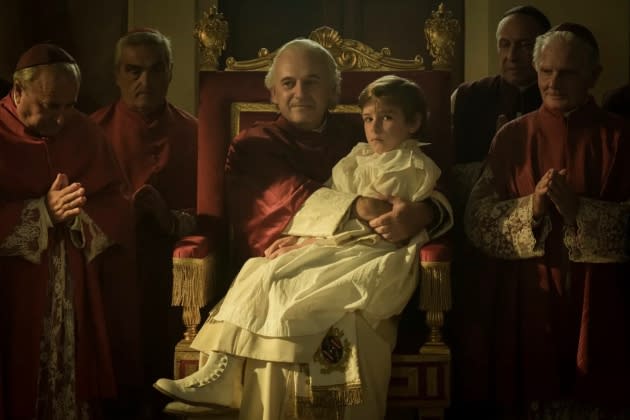‘Kidnapped’ Review: Sins Of Holy Fathers Remain Unforgiven In Marco Bellocchio’s Authoritative Historical Drama – Cannes Film Festival
- Oops!Something went wrong.Please try again later.
- Oops!Something went wrong.Please try again later.

In 1857, 6-year-old Edgardo Mortara was stolen from his Jewish family to be raised in a Catholic seminary on the spurious grounds that a maid had secretly baptized him in the cradle. As documented with theatrical extravagance by Italian maestro Marco Bellocchio in Kidnapped (Rapito), it is a story of such unmitigated wickedness that it initially would be hard to believe if it were not meticulously referenced with times, dates and locations reminding us that although this cinematic opera does not have the feel of documented fact, Bellocchio can verify every twist in the tale, chapter and verse. Ultimately, this serves his larger purpose, which is to wind the Mortara family’s trials into the bloody story of Italy’s unification as a secular state.
The Mortara are bourgeois Jews living in a pleasant street in Bologna. Family life includes nightly prayers with their eight children and the ritual observances of Shabbat dinners, but the local community doesn’t seem to mind. Momolo Mortara (Fausto Russo Alesi) exudes solid decency. His wife Marianna (Barbara Ronchi) is a madonna whose children are a credit to her love and care. When their son is taken, the neighbors come out of their houses to hurl abuse at the emissaries sent by the chief inquisitor (Fabrizio Gifuni), a smug fanatic cast with all the quiet menace of Voldemort.
More from Deadline
Once Edgardo (Leonardo Maltese) is spirited away in the night to Rome, however, the full villainy of the church hierarchy is encapsulated in the person of Pope Pius IX (Paolo Pierobon), whose pleasure in his own infallibility is that of a born tyrant. The case is taken up by politicians and newspapers across Europe; his own advisers suggest he could curry favor with his bank if he returned the boy to his anguished parents. Such liberal nonsense only makes His Holiness all the more determined to grapple the boy close and turn him for life – because since when, he roars, did a pope have to please anyone else?
Bellocchio has the bracing anti-clericalism that only reaches full flower in those raised as Catholics, but he also conveys how seductive the bells and smells, poetry and music of the church can be. The open-hearted little boy longs for his mother, but he is visibly transported by the novel sight of the Redeemer nailed to the Cross behind his church’s altar. He wants to do well, initially because he is told he will go home sooner if he seems to have learned all his lessons, then just because he can. He is a papal favorite. That is no small thing.
That sense of the spectacular infuses the whole film, not just the grand interiors and rituals of the church services. Even in the Mortaras’ apartment, the director gives his pictorial space the depth, dramatic angles and chiaroscuro lighting of Baroque painting. Brown interiors are spotlit with golden lamps, while views of the Bologna piazza or across the roofs of Rome look like painted scenic backdrops they presumably are. We are immersed in a world constructed for effect. An orchestral score swoops and surges, sometimes at overwhelming volume, less of an accompaniment than the stuff of drama in itself.
Politics seethes behind Edgardo’s story, as it does in all Bellocchio’s films; in particular, the toadying of the official Jewish representatives to the Church authorities make the flesh crawl. When it opens up to scenes of war and the retreat of the papacy, however, the story spreads to cover everything, everywhere, rather too thinly. The gimlet focus on Edgardo’s appalling story gives way to a broad sweep across troop movements and administrative change that loses the urgency of the boy’s childhood story.
When we first see him as an adult, he is wearing a dog collar: Edgardo is a priest, something that happened in the wings, so to speak, between chapters. A single chance meeting with his older brother, now a revolutionary soldier, pins this present to the past, but the momentum of the kidnapping and its aftermath fades away. It is as if events have overtaken everybody, from the increasingly cornered Pope Pius to Bellocchio himself. That is the difficulty of real lives and true stories, of course: Too much happens. It is no surprise – and thus not a spoiler – to read an endnote telling us that Edgardo died, at 90, in a monastery.
Title: Kidnapped
Festival: Cannes (Competition)
Director: Marco Bellocchio
Screenwriters: Marco Bellocchio, Susanna Nicchiarelli
Cast: Leonardo Maltese, Fausto Russo Alesi, Barbara Ronchi, Filippo Timi, Fabrizio Gifuni, Enea Sala, Paolo Pierobon
Running time: 2 hr 5 min
Sales agent: The Match Factory
Best of Deadline
Sign up for Deadline's Newsletter. For the latest news, follow us on Facebook, Twitter, and Instagram.

